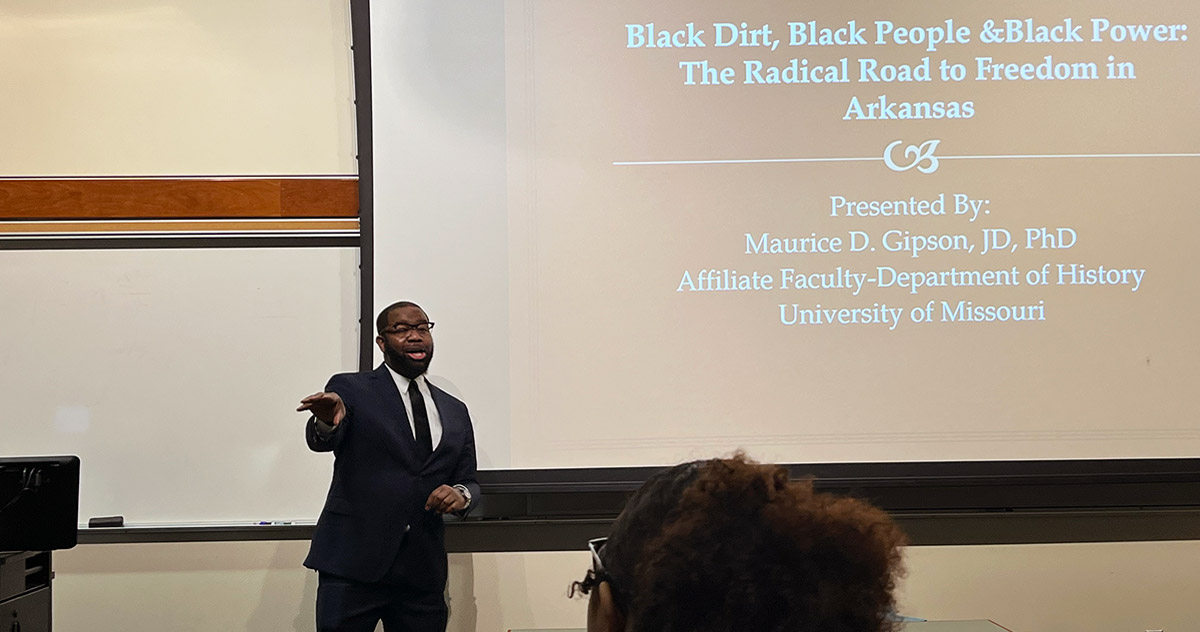Missouri State University’s African and African American Studies program welcomed Dr. Maurice Gipson as guest speaker for its annual lecture series Feb. 7.
Gipson, who earned his M.A. in history at MSU, presented “Black Dirt, Black People and Black Power: The Radical Road to Freedom in Arkansas.”
His topic explored the work of Arkansas activists who embraced Black Power as an organizing philosophy during the 1960s and 1970s.
Gipson currently serves as Vice Chancellor, Division of Inclusion, Diversity and Equity at the University of Missouri-Columbia, as well as an affiliate faculty member of the history department. He earned his doctorate in history at the University of Mississippi.
Since its inauguration in 2015, the African and African American lecture series has been held annually, welcoming scholars from Mississippi State University, Rhodes College, University of Illinois, University of Kansas, St. Louis University, University of Minnesota and University of Oklahoma.
The African and African American Studies program is housed within the Department of History.
Lecture series explores intellectual richness of African and African American studies
Associate professor of history Dr. Angela Hornsby-Gutting, the current chair of the African and African American Studies Committee, was the first to suggest the program sponsor a lecture series.
“The series would be a tangible, and routine, means of exposing Missouri State’s student body, and the Springfield community generally, to the intellectual richness inherent in African and African American Studies,” Hornsby-Gutting said.
“I also considered it a novel way to attract more students to the African and African American studies minor.”
Interdisciplinary format represents variety of disciplines
For Hornsby-Gutting, the chance to introduce students to topics in African and African American studies is invaluable.
“African and African American Studies is interdisciplinary in nature,” Hornsby-Gutting said. “Thus the lecture series has sought to illumine the Black experience from multiple angles—both historical and contemporary—while being representative of several academic fields.”
According to Hornsby-Gutting, the series has hosted scholars of history, cultural geography, Pan-African studies and ethnography. Topics have included the history and legacy of racial violence; the spatial geography of the enslaved; social protest movements involving Africans and those of African descent in the United States and the Caribbean and—most recently—Gipson’s research on student activism on southern college campuses during the 1960s and 70s.
“The lectures allow our students the opportunity to ‘rub shoulders’ with both junior and senior scholars who have demonstrated their scholarly expertise in a variety of subject matter,” she added.
Developing career skills and cultural competence
Hornsby-Gutting explained that the lecture series allows students to learn more about a minor in African and African American Studies.
“There are more than thirty cross-listed academic courses (with the AAS prefix) available during the academic year,” she said. “By taking African centered courses in history, political science and sociology/anthropology, for example, students can better appreciate the complexity of the continent and its peoples.”
Hornsby-Gutting stressed that studying African and African American studies also enhances overall career skills.
“African and African American Studies provides the foundation for diverse careers in the economic sector, from government service and education, to foreign service, health care, scientific research, marketing, social work and consulting,” she said.
In addition, because the lecture series highlights the principles of diversity, inclusion and cultural competency, it aligns with MSU’s public affairs mission, Hornsby-Guttling added.
“By centering on the Black experience—study of African Americans, Africa, and the African Diaspora—the annual lecture series, with its interdisciplinary emphasis and wide range of perspective, promotes vital and necessary engagement on a multitude of contemporary issues of relevance to human culture.”
Creating space for dialogue
More than anything, Hornsby-Gutting enjoys how the lecture series inspires dialogue between the speakers and students.
“I find those conversations intellectually stimulating for both parties,” she said. “The lecture series provides students the ability to find lasting resonance with the speaker’s words, whether that be through the pursuit of additional coursework, study abroad opportunities, or civic activism.”

